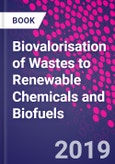Biovalorisation of Wastes to Renewable Chemicals and Biofuels addresses advanced technologies for converting waste to biofuels and value-added products. Biovalorisation has several advantages over conventional bioremediation processes as it helps reduce the costs of bioprocesses. Examples are provided of several successfully commercialized technologies, giving insight into developing, potential processes for biovalorisation of different wastes. Different bioprocess strategies are discussed for valorising the wastes coming from the leather industry, olive oil industry, pulp and paper, winery, textile, and food industries, as well as aquaculture.� A section on biorefinery for hydrocarbons and emerging contaminants is included to cover concepts on biodesulfurization of petroleum wastes, leaching of heavy metals from E - waste, and bioelectrochemical processes for CO2.� Chapters on algal biorefinery are also included to focus on the technologies for conversion of CO2 sequestration and wastewater utilization.
Biovalorisation of Wastes to Renewable Chemicals and Biofuels can be used as course material for graduate students in chemical engineering, chemistry, and biotechnology, and as a reference for industrial professionals and researchers who want to gain a basic understanding on the subject.
Please Note: This is an On Demand product, delivery may take up to 11 working days after payment has been received.
Table of Contents
Part 1: Biovalorisation of Industrial Wastes 1. Anaerobic biovalorisation of leather industry solid waste and production of high value-added biomolecules and biofuels 2. Valorization of olive oil industry wastes and production of ethanol and high value-added biomolecules 3. Anerobic treatment of pulp and paper industry waste 4. Biovolarisation of winery industry waste to produce value added products 5. Conversion of Textile effluent waste water to fertilizer using cyanobacteria 6. Anaerobic bioconversion of poultry industry-derived wastes for the production of biofuels and other value-added products 7. The Intertwined Facets of Membrane Technology for Industrial Effluents 8. Biovalorisation of food industry wastes (cheese whey and molasses) to galactosidases by recombinantPart 2: Biorefinery for Hydrocarbons and Emerging Contaminants 9. Biodesulfurisation of petroleum wastes 10. Microbial leaching of heavy metals from E
waste : opportunities and challenges
Part 3: Biovalorisation of agricultural biomass 11. Recent trends in biorefinery based valorization of lignocellulosic biomass 12. Protein Engineering Approaches for Lignocellulosic Ethanol Biorefinery 13. Biovalorisation potential of Agro-forestry/industry biomass to Lactic acid: Opportunities and Challenges 14. Vermicomposting of organic wastes and the production of vermicompost 15. Microbial Electrolysis cells for converting wastes to Biohydrogen 16. Agro-Based Sugarcane Industry Wastes For Production Of High Value Bioproducts
Part 4: Algal Biorefinary 17. Microalgal Biovalorisation: Conventional and Non-Conventional Approach 18. Integration of wastewater valorization with microalgae for biofuel production 19. Microalgae in Bioelectrochemical Systems: Technological Interventions 20. Bioleaching 21. Membrane separation technologies for downstream processing








